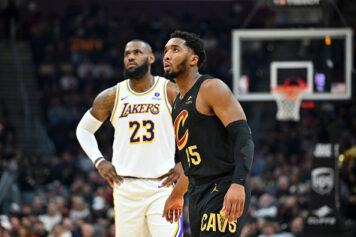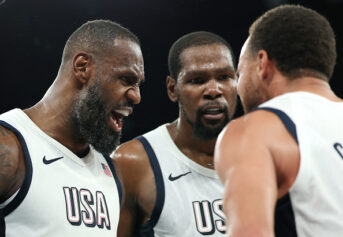So was that a legacy game for LeBron James or not?
Since 2010, no less than six postseason games – the first being Game 6 of the 2010 Eastern Conference semifinals – have been preceded by discussions of what those games would mean to his legacy. No one else’s. Just his.
But if you want to see how insanely inconsistent we can be in defining legacies, or even deciding who has one, think of all the major players in Game 6.
There was James, whose early struggles finishing and late fumbles would have been the biggest story of a game where he scored 30 points in regulation and finished with a triple double. The yellow tape wrapped around the court in the fourth quarter was for the Spurs’ pending victory celebration. But, metaphorically, it would have signified the death of all the progress and image rehab last year’s title brought James. In a postseason where the purported Big Three looked more like Gladys Knight and the Pips, carrying a wounded unit to The Finals and falling to one of the most battle-tested cores of all-time would have meant nothing. Dropping a pass in transition would have said it all.
There was Dwyane Wade, who made his legacy in 2006. Nothing has mattered since. Not his teams’ inability to get out of the first round of the playoffs until James and Chris Bosh arrived in Miami. Not the fact that his presence has not improved the Heat, nor the fact that the Heat roared back in the fourth quarter without him, stalled and lost the lead with the ball in his hand late in regulation. Tuesday night, with the stakes at their highest, he made his team worse. But his legacy was secure.
So was Tim Duncan’s, thanks to four championships and three Finals MVPs. The Duncan who did those things largely exists in the past, though he was Time Machine Timmy for the first 32 minutes of the game. He dropped an easy 30 on the Heat…and didn’t score again. He led his team to a 13-point lead then disappeared when the game mattered most. And when he retires, few will remember that, and the ones who do won’t care.
This season was probably Tony Parker’s best. He was a legitimate MVP candidate before hurting his ankle late in the season, and many have gone as far as saying he’s the best player in the league after the NBA’s only two true superstars, James and Kevin Durant. He has won a Finals MVP. He has also been wildly inconsistent this series, and he went 6 for 23 from the floor in the game that could have clinched a championship. But Tony Parker doesn’t seem to have a legacy; at least not one anyone talks about. So none of that will matter.
Ray Allen might be the greatest shooter in NBA history. That’s one helluva legacy. It’s also one that can’t be affected by postseason results. Allen has been a champion, but he’ll be remembered and revered for his skill, and nothing he could do would change that. That might be the best thing that ever happened to the Heat, for only the greatest shooter of all-time could get away with ignoring the best player in the world when he called for the ball to take the winning shot with the season on the line. After the game, Allen dismissed the idea that he even considered passing to James, who cut into the Spurs' 94-89 lead with a three-pointer of his own just 15 seconds earlier. Allen’s legacy was secure, and it only got more bulletproof Tuesday night.
Fittingly, this all comes back to James. Everything in the NBA has come back to him for the last four seasons. With a looming Game 7, the eyes on him are more intense than ever. His story has reached its most climactic chapter, one that could make or break the way he is remembered. If Miami wins, he will join Russell, Magic, Zeke, Jordan, Dream, Shaq and Kobe as repeat champions. He will have bookended an Olympic gold medal with NBA titles. The last two seasons will become the stuff of lore. He may never win the seven titles he mentioned at a pep rally in 2010, but he’ll have enough to keep people off his back for a while.
And that might only be possible because Allen looked him off like he was a rookie.
With all these moving parts, we still try to figure out James’ place in history, though he is – and we are – fully immersed in the present. It’s irrational and selective, but it’s hard to avoid when talking about a once-in-a-generation talent. Duncan may be one of the 10 best players of all time, but LeBron might be so much more. And whether or not he’s remembered as such is dictated by so many things – big and small – that have nothing to do with him.
We clearly recognize the folly in this approach. Otherwise, everyone would be graded on the fly like James is. Needless to say, that’s not the case.
The most succinct summary of Game 6 of the NBA Finals came from James. “Both teams had the will to win,” he said from the dais postgame. “We just made one more play.” But the one that kept this series alive, that spared him the embarrassment of explaining what happened this time, was the one he wasn’t allowed to make.
So was this a legacy game? It wasn’t for Duncan, Parker, Wade or Allen. Ultimately, it wasn’t for James, either. Game 7? It will be about James’ legacy and his alone, even if the outcome will have just as much to do with those whose names were made long ago.



